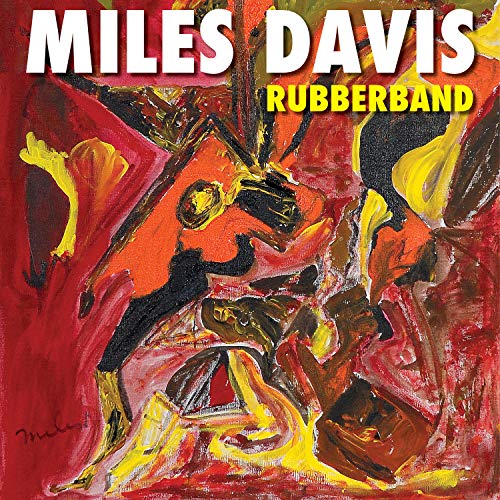
Miles Davis
Rubberband
Release Date: Sep 6, 2019
Genre(s): Jazz
Record label: Warner Bros.
Music Critic Score
How the Music Critic Score works
Buy Rubberband from Amazon
Album Review: Rubberband by Miles Davis
Very Good, Based on 6 Critics
Based on rating 7/10
Mixed media artist Mike Hansen coined the term "re-bop" in the early '90s to describe the mining of Verve, Blue Note and other jazz label archives by emerging hip-hop artists. The term applied just as accurately to Guru and US3 back then as it does now to this reconstructed Miles Davis effort. Rubberband is a kind of well-intended Frankenstein's monster of a project. By the time of its recording in 1985, Davis had become disgruntled with longtime label, Columbia Records, and was now a member of the Warner Bros. roster. His interests had ….
Based on rating 7/10
Reviewing a Miles Davis album is a tricky thing to do. Reviewing a "lost" Miles Davis album that fans have been salivating over the prospect of for more than 30 years feels more than tricky, it feels potentially dangerous. Original producers Randy Hall and Zane Giles, along with Vince Wilburn Jr., the nephew of the great man, have toiled hard to maintain the vibe of the original recordings from 1985 and 1986, made after Davis departed Columbia Records for Warner, and sought to add a sprinkling of contemporary production and mix techniques.
Based on rating 3/5
In 1985, Miles Davis did the unthinkable and quit Columbia, stunning both his label and the jazz world. He had been with the company for 30 years but their refusal to fund and release his album, Aura, combined with the attention they were lavishing on rising trumpet star, Wynton Marsalis, galled the then 59-year-old horn player, who moved to Warner Bros where he received a million-dollar welcome. Though his Warners debut, 1986's Tutu, was a resounding commercial triumph, what the public didn't know was the album was a case of "third time lucky" as two previous sessions for the label had been aborted.
Opinion: Fairly Good
N ewly signed to the Warner Bros label in 1985, Miles Davis set about recording an album intended to capture a new, young audience. He was given a more or less free hand and there were rumours of Chaka Khan and Al Jarreau being involved. But after three months, Warners, impatient at what they considered to be a lack of progress, pulled the plug. The tapes were shelved and there they remained for 34 years, until tracked down by Miles's nephew, Vince Wilburn Jr, who had been the drummer on the aborted album.
Opinion: Fairly Good
'W hen I'm playing, I'm never through. It's unfinished," Miles Davis said in a revealing interview with the NME in 1985. "I like to find a place to leave for someone else to finish it. That's where the high comes in." As it undoubtedly would have when John Coltrane was reacting to the teasing daydreams curling from Davis's trumpet-bell.
Opinion: Average
The Lowdown: Miles Davis was a bandleader first and second a trumpeter, who just about invented the "cool jazz" sound that dominated the late '50s and early '60s. While he dropped several classic albums during this period, including 'Round About Midnight and Kind of Blue, Davis abandoned the buttery smoothness that made him famous in favor of tireless reinvention. For example, 1970's Bitches Brew was hardly the first psychedelic jazz record, but it might've been the first psychedelic jazz record to make money.
'Rubberband'
is available now

